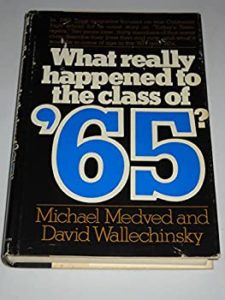
My college classmate and fellow baby boomer, Michael Medved, co-authored the book What Really Happened to the Class of 1965 on the occasion of the 10th reunion of his high school class. The book was interesting at the time, both because it was cleverly written, and because there was already somewhat of a society-wide mystique surrounding the first baby boomer class to graduate from high school, then in 1969, from college. That was me!
The term seems first to have found public usage in 1963, in an article in the Newport News Virginia Daily Press that warned of a tidal wave of college enrollment coming as the “Baby Boomers” were growing up. It wasn’t long before boomers (born betwen 1946 and 1964) and our elders accepted it as a collective description of most all of us. I’m not aware that any prior generation of Americans

thought of themselves , at the time, in such singular fashion. Certainly by 1966, when Time Magazine named our entire age-group the “Persons of the Year,” we had become a recognizable singularity. I don’t think the “Silent Generation” (born from 1927-1945) always thought of themselves in the collective terms we boomers always have. Did the “Greatest Generation,” (born from 1908-1926) think of themselves as some kind of unified group until Tom Brokaw christened them in 1998? But boomers are such a coherrent group that they have spawned well over a 100 blogs like this one and a website to monitor them.
However, you don’t need to dig very deeply before being reminded that, though we have talked for more than 50 years of the “baby boomers” as an identifiable group, we boomers are not all that similar with each other. Seven times the country has elected a baby boomer president (Bill Clinton, George W. Bush and Barack Obama twice each, and Donald Trump once I hope). The ideological, social and behavioral disparities among these four men would certainly belie any thesis that baby boomers all think alike, act alike, or want the same things.
Turns out, rather than being a bunch of liberals like even conservatives have assumed, all spawned by the anti-war movement, we are more conservative than liberal, and generally becoming more conservative every year. For example, a majority of us only voted for the Democratic Presidential nominee once since 1972 (Jimmy Carter in 1976). And in 2016, when we might have expected that liberal boomers would have cast an electoral majority for the first woman candidate of a major party, a majority of boomers voted for Donald Trump.
But is there nothing that unites us besides our chronological age? Turns out, I think there is. Born out of the strident protests against the Vietnam War and for Civil Rights, our generation was fired early on by bitter political and social combat. “Hell no! We won’t go!” We may have been the first to declare war on our parents and to identify a deep and wide generation gap with all of our elders. “Never trust anyone over 30!” We decried a credibility gap with our leaders, and became the first generation of Americans to widely distrust our government. Not everyone went so far as the English rock group the Who, whose song My Generation concluded “I hope I die before I get old.”
Why were we so combative? Was it our idealism? Our narcissism? Both? We thrived on mortal combat and we scorned compromise. The first boomer President (Bill Clinton) and the first boomer Speaker of the House (Newt Gingrich) brought the no holds barred sense of total war into the national political realm in 1995-96. Their mortal struggle over the future of social security led to a high-profile government shut-down. Neither of these young boomers was willing to seek compromise where both could win something, neither lose entirely. Instead they rolled right up to the edge of the cliff, before Gingrich knuckled under and Clinton won a clear victory. Three years later, Gingrich was gone–tossed by a blood-thirsty Republican majority who never forgave him for “losing to Clinton.” Oh, and still we have no resolution to the continuing problems of sustaining social security these 25 years later.
Politics was labelled by the nineteenth century German Chancellor Otto von Bismarck the art of the possible, the attainable, the art of the next best. Politics today in the US (and maybe even globally) has become simply a battle you must win, not an art to mediate between differing factions in order to produce a governing strategy for accomplishing good ends for the community. Political discourse is not about producing converts to your position in order to garner their votes for your policy. Instead, the aim is to vanquish your foe in an obscenity-filled tweetstorm. And get lots of “likes” and “retweets” in the process.
In 2000, Robert Putnam published a ground-breaking study of the decline in civic engagement and trust in the US since about 1960 (Bowling Alone:The Collapse and Revival of American Community). Across multiple fronts, America started in the 1960’s, just as baby boomers were entering the socio-politcal fray, to witness a decline in our shared common values and willingness to participate in common efforts (from churches, to PTA’s to legislatures). We began to lose our willingness to bind ourselves together in common effort toward shared goals. Did 20-something boomers coming of age cause an entire society to lose it’s way, and come to prefer combat and winning to problem-solving and progessing? Doubtful that the blame is all ours. But the fact is our current (and hopefully last) boomer president has completed the transformation of politics from the art of the possible to the transactional process of winning…winning each skirmish, no matter how insignificant. And he’s done so with the full-throated support of those who like him, and the equally full-throated hatred of those who don’t.
And if you don’t agree with me, just shut up, will you?

It’s never too late.